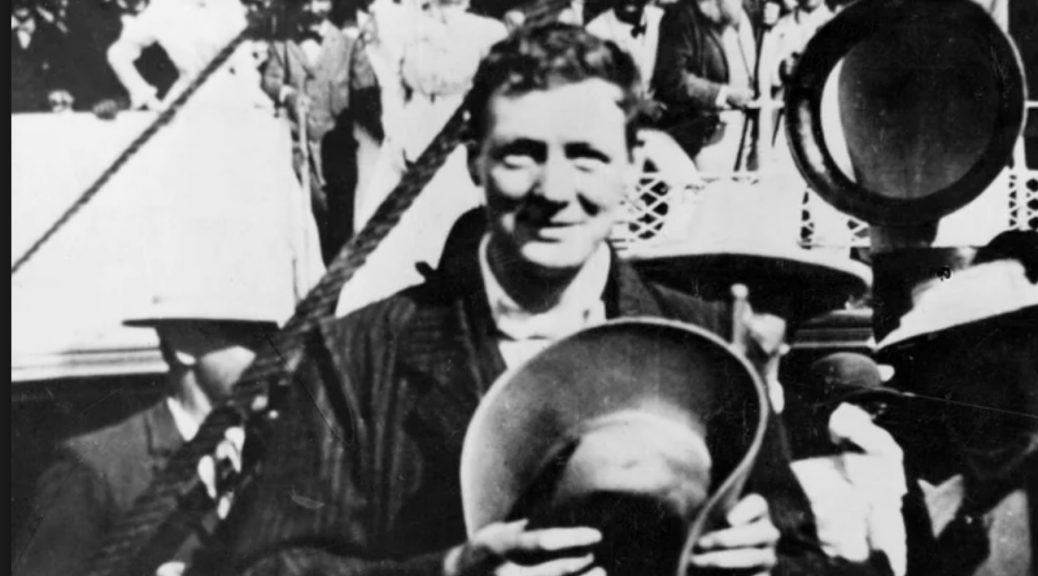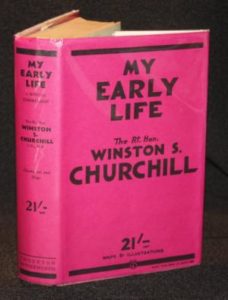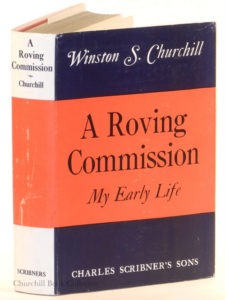
“A Sun that Never Sets”: Churchill’s Autobiography, “My Early Life”
Winston S. Churchill, My Early Life: A Roving Commission. (London: Thornton Butterworth, 1930; New York: Scribners, 1930.) Numerous reprints and editions since, including e-books. Excerpted from the Hillsdale College Churchill Project. For the full article, click here.
Connoisseur’s Guide
My Early Life appeared a year before the last volume of The World Crisis. The subtitle, “A Roving Commission,” is from the first chapter of Churchill’s Ian Hamilton’s March. It seems he took it from an earlier novel by G.A. Henty, one of his favorite authors. The titles changed places in the first American edition.
A wonderful treat is in store in this most approachable of Churchill’s books. Harold Nicolson in his 1930 review likened My Early Life to “a beaker of champagne.” His bubbly expression is not shy of the mark. If the reader was drawn to Churchill by his war memoirs, his autobiography will come as a revelation. The memoirs chronicle a very public struggle against national extinction. The autobiography charts a young man’s private struggle to be heard. But the same style and pace is there, the same sense of adventure, the piquant humor. We readers are enabled to peer over Churchill’s shoulder as events unfold.
Vanished Age
Of course he was born with certain advantages,” as William Manchester put it in his foreword to a 1980s edition:
…his youth was virtually incomprehensible to most people then alive. He had been born into the English aristocracy at a time when British noblemen were considered (and certainly considered themselves) little less than godlike. His grandfather was Viceroy of Ireland….These dominant forces—the class into which he had been born—were masters of the greatest empire the globe has ever known, comprising one-fourth of the earth’s surface and a quarter of the world’s population, thrice the size of the Roman Empire at full flush. They also controlled Great Britain herself, to an extent that would be inconceivable in any civilized nation today. One percent of the country’s population—some 33,000 people—owned two-thirds of its wealth, and that wealth, before two world wars devoured it, was breathtaking.

Nevertheless, Churchill had little handed to him, once family influence had placed him where he wanted to be. He could not have embarked on those thrilling war junkets abroad without the influence of his mother and other great personages. But once there he was on his own, and he acquitted himself well.
Life cycle
My Early Life begins with Churchill’s first memories at the “Little Lodge” in Dublin. Here his father lived as secretary to his grandfather, the Duke of Marlborough. Winston’s description of his nurse, Mrs. Everest, is heartwarming. The accounts of the Royal Military Academy; his adventures as a war reporter in Cuba, India and South Africa; his escape from the Boers in 1899, and charge of the 21st Lancers at Omdurman, will hold the reader’s attention to the end. Here and in his later account of entering politics and Parliament, we can see Churchill’s emerging political philosophy, studded with remarkably advanced views on British society and the Empire.
The text was not entirely fresh when the book appeared in 1930. Churchill had been writing autobiographic books since 1898. But the book melded his experiences together, added a lot, and had a huge printing over the years. There is a copy for every reader, be it a cheap paperback or a rare first edition.
It is notable that My Early Life was one of the two Churchill works excerpted by the Nobel Library—for Sir Winston’s 1953 Nobel Prize in Literature. Churchill is at his dazzling best as chronicler and memoirist. Freshly entered in the political wilderness, he wrote thinking that his political career was over.
—from Richard M. Langworth, A Connoisseur’s Guide to the Books of Sir Winston Churchill (London: Brasseys, 1998, reprinted 2002).
An appreciation by Henry Fearon

Churchill’s dedication of My Early Life “To a new generation” confesses his view that he had given a picture of a distant time. How far away those late Victorian years are now.
His account of childhood, school, the Army, and his first arrival at the House of Commons never flags in its interest or importance. Yet even at the time of its writing, Churchill could never have foreseen the enduring weight of Fortune which was to settle upon him.
Fine and interesting as the My Early Life is, there is one small drawback to seasoned readers. Just as we are expecting the author’s politics to entertain us, we are hurried backwards to tales already told in the Malakand Field Force, The River War, Ian Hamilton’s March, and his escape from the Boers in London to Ladysmith via Pretoria. Yet this is a tale well worth reading—or re-reading. My Early Life will always be, I believe, the most readable of Churchill’s books.
* * *
Mr. Fearon was a distinguished bibliophile and collector. Years ago left me a copy of his unpublished commentary on Churchill’s books. He had, I think, a way with words. His full account of My Early Life is a click away. —RML






